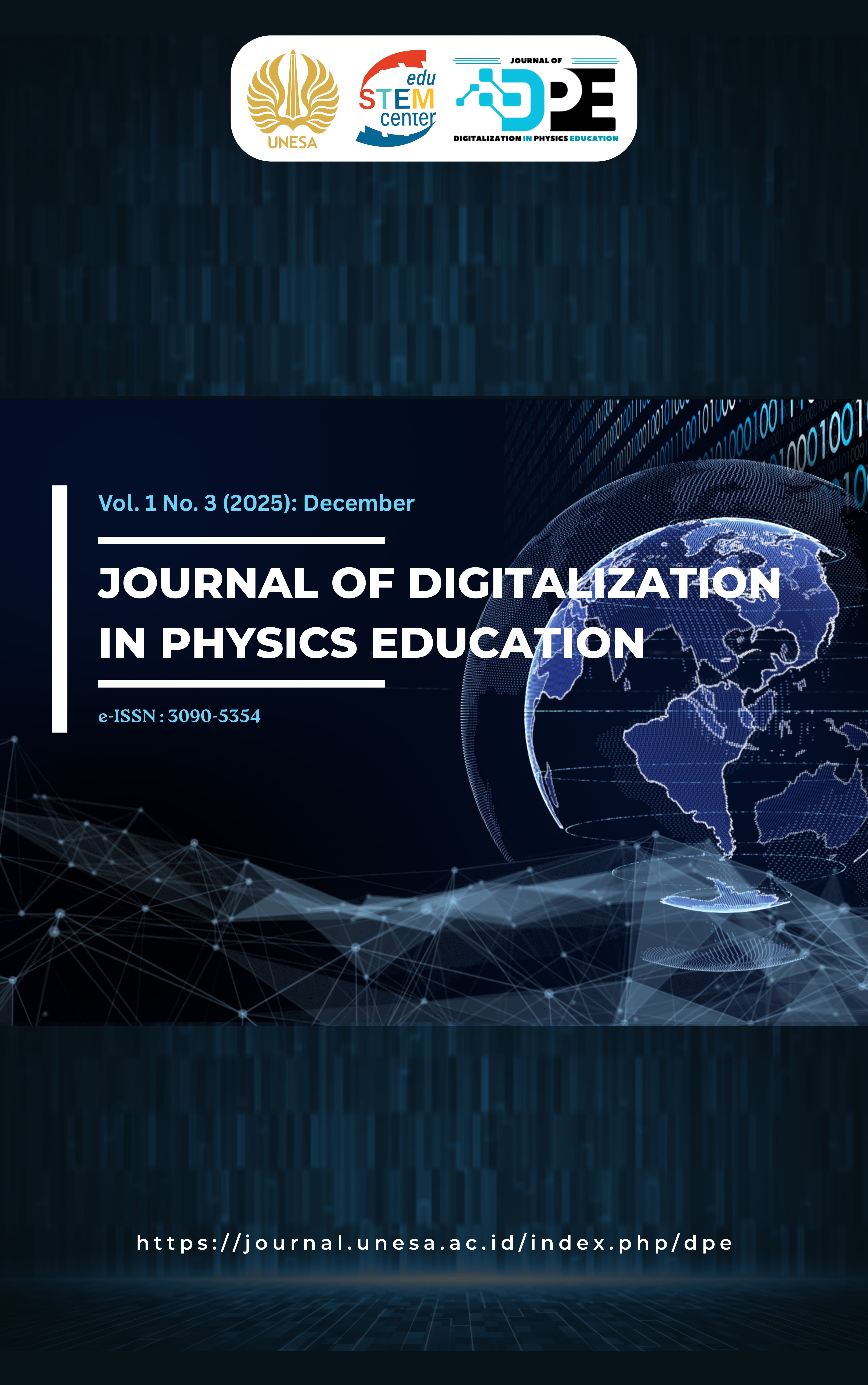The Effectiveness of Guided Inquiry Learning Model with Digital Simulations to Enhance Students’ Critical Thinking Skills in Physics
DOI:
https://doi.org/10.26740/jdpe.v1i3.43522Keywords:
Critical Thinking, Digital Simulation, Guided Inquiry, Harmonic OscillationAbstract
Objective: This study aims to determine the effectiveness of the guided inquiry learning model integrated with digital simulation in enhancing students’ critical thinking skills on the topic of harmonic oscillation. Method: A quasi-experimental method with a pretest-posttest control group design. The participants were two Grade XI classes at SMAN 1 Pacet: the experimental group received guided inquiry learning with digital simulations, while the control group received guided inquiry learning without simulations. Instruments used included critical thinking skill tests (pre-test and post-test), classroom implementation observation sheets, and student response questionnaires. Results: The results showed that the implementation of learning in the experimental class was in the “outstanding” category, with an average score of 3.62 (89.5%). The paired t-test analysis indicated a significant improvement between pre-test and post-test scores in both the experimental (p=0.000) and control (p=0.003) classes, with mean score differences of 32.90 and 20.20, respectively. The N-Gain value of the experimental class was 0.68 (medium category), which was higher than the control class’s N-Gain of 0.39 (medium category). Student responses toward the learning approach were highly positive, with an overall average 0f 82% in the “outstanding” category. Novelty: This study highlights the novelty of integrating PhET digital simulations into guided inquiry learning to foster critical thinking in physics education, specifically in understanding harmonic oscillation.
References
Angwaomaodoko, E. A. (2024). Critical thinking: Strategies for fostering a culture of inquiry in education. Path of Science, 10(9), 1001-1007.
Antonio, R. P., & Prudente, M. S. (2024). Effects of inquiry-based approaches on students' higher-order thinking skills in science: A meta-analysis. International Journal of Education in Mathematics, Science and Technology, 12(1), 251-281.
Arifin, Z., Saputro, S., & Kamari, A. (2025). The effect of inquiry-based learning on students’ critical thinking skills in science education: A systematic review and meta-analysis. Eurasia Journal of Mathematics, Science and Technology Education, 21(3), em2592. https://doi.org/10.29333/ejmste/15988
Susilawati, S., Doyan, A., Mulyadi, L., Abo, C. P., & Pineda, C. I. S. (2022). The effectiveness of modern physics learning tools using the phet virtual media assisted inquiry model in improving cognitive learning outcomes, science process skills, and scientific creativity of prospective teacher students. Jurnal Penelitian Pendidikan IPA, 8(1), 291-295. https://doi.org/10.29303/jppipa.v8i1.1304
Febriant, A., Pratidhina, E., Wijaya, A. (2024). Development of student worksheets using guided inquiry model assisted by PhET to support science learning in junior high school. Jurnal Ilmiah Profesi Pendidikan. ISSN (Print): 2502-7069; ISSN (Online): 2620-8326.
Fitriani, S. R., Doyan, A., Taufik, M., & Wahyudi, W. (2024). The effect of the guided inquiry model assisted by PhET media on students’ critical thinking skills. Jurnal Penelitian Pendidikan IPA, 10(6), 3527-3532. https://doi.org/10.29303/jppipa.v10i6.4852
Hake, R. R. (2002). Relationship of individual student normalized gain to class averages. The Physics Teacher, 40(2), 64–67.
Jatmiko, B., Prahani, B. K., Munasir, Supardi, Z. A. I., Wicaksono, I., Erlina, N., Pandiangan, P., Althaf, R., & Zainuddin. (2018). The comparison of ORIPA teaching model and problem-based learning model effectiveness to improve critical thinking skills of pre-service physics teachers. Journal of Baltic Science Education, 17(2), 300–319. https://doi.org/10.33225/jbse/18.17.300
Kwangmuang, P., Jarutkamolpong, S., Sangboonraung, W., & Daungtod, S. (2021). The development of learning innovation to enhance higher order thinking skills for students in Thailand junior high schools. Heliyon, 7(6), e07309.
Lam, C., & Wolfe, J. (2023). An introduction to quasi-experimental research for technical and professional communication instructors. Journal of Business and Technical Communication, 37(2), 174-193. https://doi.org/10.1177/10506519221143111
Lintangesukmanjaya, R. T., Prahani, B. K., Sunarti, T., & Saphira, H. V. (2024). Profile of critical thinking skills of senior high school students in physical wave material. In Journal of Physics: Conference Series, 2900(1), 012030. DOI: 10.1088/1742-6596/2900/1/012030
Lintangesukmanjaya, R. T., Prahani, B. K., Dwikoranto, D., Alhusni, H. Z., & Kurtuluş, M. A. (2025). Technology integration for SDGs-oriented social science education: A bibliometric perspective. E3S Web of Conferences, 640, 02017. https://doi.org/10.1051/e3sconf/202564002017
Marzuki, D. Santo B. (2023). Student activities and learning outcomes on the topic of characteristics of living things. Jurnal Review Pendidikan dan Pengajaran, 6(2), 356–365
Nurmayani, L., & doyan, A. (2018). The effect of guided inquiry learning model on students’ physics learning outcomes. Jurnal Penelitian Pendidikan IPA, 4(2).
Plummer, K. J., Kebritchi, M., Leary, H. M., & Halverson, D. M. (2022). Enhancing critical thinking skills through decision-based learning. Innovative Higher Education, 47(4), 711-734. https://doi.org/10.1007/s10755-022-09595-9
Putra, D., Sujatmiko, B., Dwikoranto, D., Lintangesukmanjaya, R. T., & Bergsma, L. N. (2025). Development of Web-Let's learn online to improve student competence in learning network device installation and configuration with the PjBL model. JPPS (Jurnal Penelitian Pendidikan Sains), 203-213. https://doi.org/10.26740/jpps.v14n2.p203-213
Rahman, H. A., Bachri, B. S., Maureen, I. Y. (2024). Test instruments for measuring critical thinking skills in statistics material. Jurnal Cendekia: Jurnal Pendidikan Matematika, 8(2), 1472–1480.
Rizaldi. D. R. Jufri. A. W. & Jamal, J. (2020). PhET interactive simulation in physics learning process. Jurnal Ilmiah Profesi Pendidikan, 5(1)
Saputra, H. (2020). Mathematical critical thinking ability. Perpustakaan IAI Agus Salim Metro Lampung, 2, 1–7.
Sutiani, A. (2021). Implementation of an inquiry learning model with science literacy to improve student critical thinking skills. International Journal of Instruction, 14(2), 117-138.
Zulyusri, Z., Elfira, I., Lufri, L., & Santosa, T. A. (2023). Literature study: Utilization of the PjBL model in science education to improve creativity and critical thinking skills. Jurnal Penelitian Pendidikan IPA, 9(1), 133-143. https://doi.org/10.29303/jppipa.v9i1.2555
Downloads
Published
How to Cite
Issue
Section
License
Copyright (c) 2025 Journal of Digitalization in Physics Education

This work is licensed under a Creative Commons Attribution 4.0 International License.
 Abstract views: 156
,
Abstract views: 156
, PDF Downloads: 100
,
PDF Downloads: 100
, PDF Downloads: 37
PDF Downloads: 37


